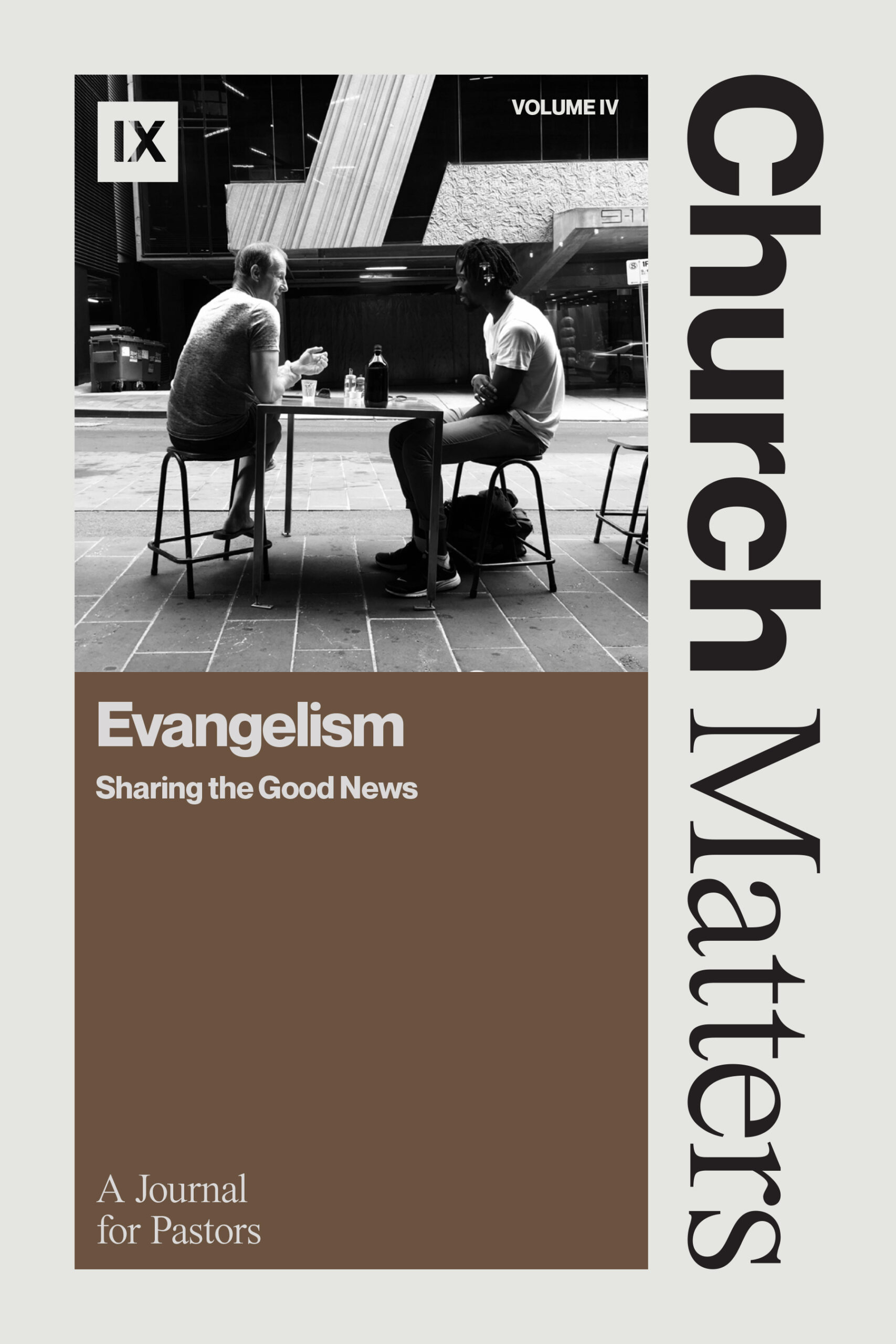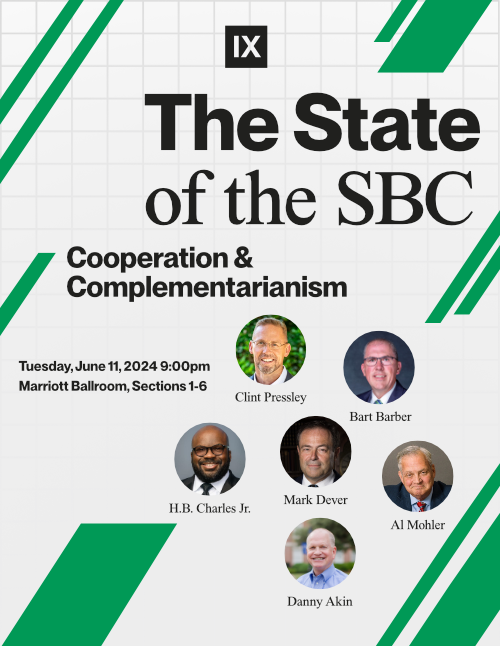How to Equip the Church for Evangelism
As a teenager, I asked out a cute girl. She took one look at me, said, “No thanks,” and gave me a Bible instead.
And there, reading alone, God converted me reading through the Gospel of Mark.
You want a philosophy for evangelism? You don’t need gimmicks and games. Get people into the Bible and watch God work.
Years later, I was “candidating” for the lead pastorate at University Baptist Church in Fayetteville, Arkansas. In a public Q&A session, a member of the congregation asked, “What’s your plan to reach the community?”
Imbedded in that question lies a whole host of assumptions about what evangelism is, who does it, and even about how it’s to be done. Truth is, I didn’t have a great answer ready to go, so I responded, “Tell me what you’re doing now.”
She highlighted a program that goes into an under-served, low-income housing complex, a community event during a motorcycle rally, a food pantry, and a community “helps” ministry. At one level, it sounded pretty impressive. But you could tell from her response that she didn’t feel it was especially effective.
I don’t think that story is unique. Big-hearted, well-intentioned Christians want to see the gospel go forth, but they’re at a loss over what to do. That’s because our churches don’t need another event. Instead, the people needed to be equipped.
If evangelism is the expectation of every disciple (Matt. 28:19), then disciples need to be equipped in evangelism. But how?
Teach It
One Sunday after the service, I was standing at the back door greeting people as they exited. Out of the corner of my eye, I saw a sweet older saint making a beeline to me with someone I didn’t recognize. She came right up and said, “Pastor, there’s someone I’d like you to meet.” She introduced me to this African student at the University of Arkansas, and she said, “I knew you would like to meet him, and I told him he should think about attending the next new member class.”
I was left scratching my head. New member class? How’d we get from here to there?
I asked him how long he had been visiting. “Two weeks.” I asked about his studies and if he’d been part of a church back home. “No, but I’ve learned lots about Baptists from TV.”
“Oh brother, now we’re in trouble,” I thought.
That conversation revealed a number of valuable things. For starters, at least that lady understands the importance of membership! But when a guest came, her first instinct was to bring him straight to me, the pastor, to look for a program to plug him into or an event to attend. I’m guessing she suggested the new member class because she assumed someone happily visiting the church would be a Christian.
That’s why we need to start equipping our churches by teaching what evangelism is. Evangelism isn’t simply hosting seminars on apologetics. It’s not throwing a flashy event or starting a glitzy new program. Those can all be fine, even appropriate things. But evangelism is proclaiming the gospel with the purpose to persuade.
When Paul arrives in Thessalonica in Acts 17:2–3, we read,
And Paul went in(to the synagogue), as was his custom, and on three Sabbath days he reasoned with them from the Scriptures, explaining and proving that it was necessary for the Christ to suffer and to rise from the dead, and saying, “This Jesus, whom I proclaim to you, is the Christ.”
Luke notes it was Paul’s custom to proclaim the gospel from the Scriptures. We read in the next verse that some “were persuaded” and joined him (Acts 17:4)—proclamation with the purpose to persuade.
We need to be clear on what evangelism is, as well as what conversion is. It’s not getting someone to recite a prayer after you, though it’s good to pray. Nor is it walking an aisle. If evangelism is proclaiming the gospel, we need to equip our people on the ABCs of that gospel:
- God is holy.
- Man is sinful.
- Christ is our necessary substitute.
- Respond with repentance and belief.
While the gospel can mean more than that, it never means less. Yet some of our people may be neglecting it. Priscilla and Aquilla had to pull the mighty Apollos aside and “explain the way of God to him more accurately” (Acts 18.26). He needed to be equipped.
We not only need to teach what evangelism is, but also who does it. Years ago, when my wife and I got plugged into a new church, they gave us a “spiritual gifts inventory,” which is kind of like an older form of the Enneagram. Your spiritual gift determined how you functioned and, therefore, how you ought to serve.
Many of us treat evangelism like it’s a spiritual gift—either we have it or we don’t. But in the Bible, Christians are called disciples. And Jesus gives his disciples marching orders: they’re to go make more disciples. Evangelism, then, isn’t the job of some Christians, but the joy of every Christian. It’s not reserved for the paid professionals.
Pastors are to “equip the saints for the work of the ministry” (Eph. 4:12). We so often think of pastors as professional communicators, managers, or event-planners. But in the Bible, pastors are trainers. Paul says to Timothy, “What you have heard from me in the presence of many witnesses, commit (or entrust) to faithful men who will be able to teach others also” (2 Tim. 2:2).
Elders/pastors equip for ministry. Deacons and staff facilitate ministry. Members do the ministry.
Yet as we seek to be clear on what our role is, we must also be clear on what our role isn’t. It’s easy to salute the sovereignty of God while marching to the sovereignty of man. Our job is proclamation, God’s job is regeneration. As a friend of mine put it, “Our job in evangelism is to speak to the casket. God’s job is to break it open.”
Two practical suggestions to equip people to evangelize:
See How Clearly They Can Share the Gospel When They Join
During every membership interview, I ask prospective members to share the gospel with me in a minute or less. This simple exercise prepares them to do it when it counts. It also helps me to learn valuable pastoral information about them. If they can’t share it, they may not know it. And if they don’t know it, they’re not truly born again.
Instruct Your People on How to Read and Teach the Bible to Another
In evangelism, God didn’t give us an event; he gave us his Word. The Word of God is the single most powerful and potent weapon in our arsenal. Sadly, it’s the one least often used.
Augustine’s famous conversion came through the Word. He picked up a Bible and read Romans 13:13–14. It was the story of my conversion, reading through Mark 5. It’s the story of Rosaria Butterfield, who picked up the Bible to refute it, but was eventually converted.
Here’s the glorious thing with God’s Word: we pick it up expecting to read it, but it reads us! Which is why the single best thing—dare I say, the most effective thing—you can do with a non-Christian is not to invite them to hear some famous speaker, but for you to open up the Scriptures with them.
But if your congregation is like mine, that’s daunting. They quickly feel self-conscious, inadequate, even incompetent to read the Bible with someone. And if they feel that way with a Christian, how much more with a non-Christian.
Hopefully over time your preaching will help them better read and teach their Bibles. One resource I’ve found very helpful with our people is David Helm’s little book One to One Bible Reading. I use it and pass it out all the time.
Model It
Beginning with the pulpit, pastor, you yourself must preach the gospel in your sermons. Don’t presume it. Preach it.
That may sound remedial. But last year, I was given eight weeks of sabbatical. During that time, I visited about seven different churches. Some were very large, very influential churches. All would mean to be evangelical churches that would care deeply about evangelism. How many times did I hear the gospel in those eight weeks?
One time. That’s it! Sure, there were elements of the gospel in every sermon. But it was more assumed than articulated. And you don’t just want pieces of the gospel in your preaching, but the whole thing. It’s not the gospel if it tells them all about the glories of heaven but never tells them how they can get into heaven.
Preach the gospel winsomely. Preach passionately. And preach respectfully to non-Christians. I sometimes think to myself, “Preach winsomely like Dever, preach passionately like Piper, and preach respectfully like Keller.” Then I remember, I’m nothing like those guys! That’s fine. The power is in the Word, not my words.
When you preach, address non-Christians in your sermons directly. They typically appreciate and respect it. They know they’re not Christians. They’re not ashamed of it. They’re probably rather proud of it.
But you also want to create a culture where it’s normal for non-Christians to be coming into your meeting. While your assembly shouldn’t be targeted toward them, it should acknowledge them. You want members of your congregation to be thinking, “Oh man, my co-worker would have been really helped by that.”
One Sunday I was preaching James 1:19–27, where James refers to the Word as the “law of liberty.” I just camped on that phrase for a moment because we tend to think law and liberty are two opposing things. Laws constrict us, liberty frees us. But it’s right there where the Bible challenges us. I said,
In the Bible, real freedom is not the absence of any and every constraint, but rather, the presence of the right kind of constraint. True freedom is not being a slave to every whim of our passions. It’s the ability to say no to what’s wrong and yes to what’s right. That’s true freedom. And that’s the kind of freedom God’s Word alone brings.
This took me all of about a minute, and it broke down false assumptions non-Christians may have and began to rebuild a foundation of biblical truth.
But as much as you acknowledge non-Christians, you must fill your people with the glories of Christ. Preach Christ from all the Bible. Your people will not speak of what they do not savor. In life, I’ve found that I’ll listen to someone who loves something deeply.
Don Carson remarked, “If I have learned anything in 35 or 40 years of teaching, it is that students don’t learn everything I teach them. What they learn is what I am excited about, the kinds of things I emphasize again and again and again and again [with joy].”
Model that gospel joy in your pulpits and, as much as possible, in your private lives.
What’s been most helpful for me in my evangelism? Doing it with others. Nobody likes to do hard things alone, and evangelism can sometimes seem hard, even scary. Our own insecurities and fear of man get in the way.
So turn it into a team sport. Evangelizing with friends will help us to remember that it’s not finally all that complicated or scary. In fact, it can be quite enjoyable. All we’re trying to do is have a conversation with someone about Jesus. And why would I not want to do that?
Display It
Over the past few years, I’ve grown to love the architecture of Frank Lloyd Wright. There’s a simple elegance to his homes, the lines and contours, the way the hallways are somewhat dark and narrow and push you into the bright and airy main room, all centered around the hearth. The way the rear glass walls open up to the forest, making the house feel like it, too, grew up out of those surroundings and wasn’t just dropped on top of it.
As much as I try and describe it, you need to see it to really understand and appreciate it.
Friends, it ought to be like that with our churches.
Church isn’t a weekly pep-rally for Jesus. It’s not an event you attend or a building you drive to. It’s a family to whom you belong, and we want that on full display in our gatherings. We want non-Christians in our community hearing the gospel from our members, and then seeing it at work when we gather. Which means you want to draw a bright, clear line between the Christian and non-Christian.
Make membership meaningful. If your congregation is confused on who is and isn’t a Christian, the world will be too. Yet your gathering—the love members have for one another; the way they talk, pray, pursue, care—all that ought to clarify the gospel, not complicate and confuse it. Rightly understood, your Sunday gathering is one of the most powerful evangelistic tools you have. Leverage it.
Be careful to display membership well in the ordinances. Think over how you lead your people in the Lord’s Supper. Is it clear who should take it and who shouldn’t (1 Cor. 11)?
Think about how you do baptisms. When I arrived at UBC, they would do short videos of those being baptized, introducing themselves, fun facts, and then the screen would go dark. Next thing you know, they’re in the baptistry getting dunked.
Instead, I did what I had seen modeled elsewhere. The individual would come up, in person, and share their testimony of how they were saved and how God had worked in their life. Super powerful. It’s an encouragement to the Christian. God really is in the business of saving people. It’s also a challenge to the non-Christian: “Should that be me? What am I doing with the gospel?”
If you have a prayer service, leverage it for evangelism. Use part of that time to highlight testimonials. This past Sunday night, I asked the body if anyone had opportunities to share the gospel in the past few weeks.
Yes, it got awkwardly quiet for a moment. But then an individual shared about a conversation with a neighbor while they were taking out the trash. Another talked about getting into a conversation with their mailwoman about the Bible. None of those people got to share the full gospel, but they were taking steps, planting seeds, beginning conversations. It’s a start.
When you do this, you’re displaying and reminding your people how this ought to be a normal part of the Christian life, you’re providing models, and you’re demystifying it. If she can do it, why aren’t I doing it? And don’t just highlight “successes.” Highlight “failures” too. Every time we share the gospel, it’s a success. We’re to be faithful, trusting and praying that the Lord will bear fruit.
Conclusion
Before we think about planning another event, our people need to be equipped. If evangelism is the expectation of every disciple, then every disciple needs to be equipped in evangelism.
Teach it, model it, and display it, for every Christian has the joy of doing it.









